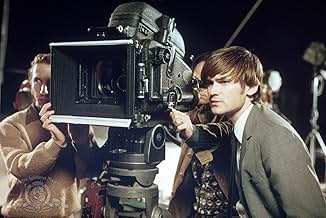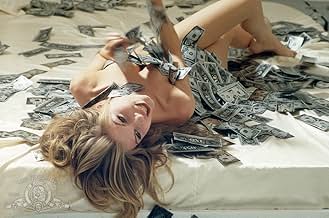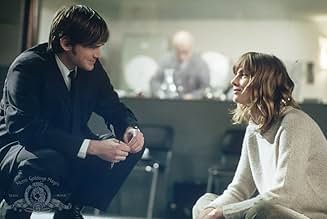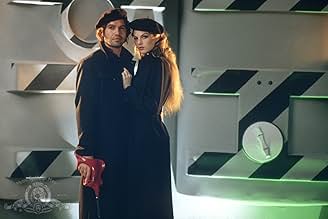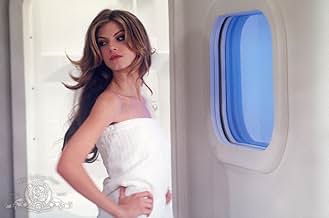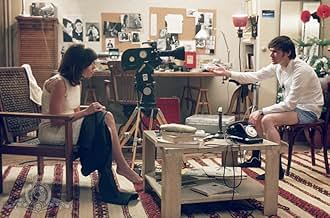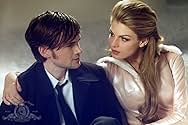PUNTUACIÓN EN IMDb
6,2/10
5,1 mil
TU PUNTUACIÓN
Un joven cineasta hace malabares con la dirección de una cursi película de ciencia ficción, mientras se enfrenta a la relación con su novia que se desmorona.Un joven cineasta hace malabares con la dirección de una cursi película de ciencia ficción, mientras se enfrenta a la relación con su novia que se desmorona.Un joven cineasta hace malabares con la dirección de una cursi película de ciencia ficción, mientras se enfrenta a la relación con su novia que se desmorona.
- Premios
- 1 nominación en total
Argumento
¿Sabías que...?
- CuriosidadesAfter being fired, Andrezej puts his fist through the screening room door. This is a reference to Francis Ford Coppola (father of director Roman Coppola) and his short temper. When the editors get a framed section of the destroyed wall, it is actually a portion of a wall the elder Coppola wrecked in his early directing days.
- PifiasIn the tunnel, when Dragonfly swerves in reverse, there already are skid marks on the ground along the path taken by the car's tires.
- ConexionesFeatured in On the Set of 'CQ' (2002)
- Banda sonoraCe Soir, Je Vais Boire
Lyrics by Gilles Thibaut
Music by Bruno Canfora
Performed by Claude François
Courtesy of Universal International Music, B.V.
Under license from Universal Music Enterprises
Reseña destacada
(Note: Over 500 of my movie reviews are now available in my book "Cut to the Chaise Lounge or I Can't Believe I Swallowed the Remote!" Get it at Amazon.)
There are two films within a film in this campy debut from Roman Coppola. There is the introspective black and white, experimental, "student" sort of film that the young director Paul (Jeremy Davies) is making in his Paris apartment, and there is "Dragonfly," a kind of Barbarella (1968) sci-fi space shoot 'em up that he ends up directing. These might be seen as the twin realities of the young film maker: on the one hand there are those short films you made at USC or UCLA film school to get your degree; on the other, there are those mindless commercial entertainments that Hollywood needs to crank out for the masses. These represent the bookends of the young director's reality.
The third film, the film that exists over and above these two, is the film that Roman/Paul would like to make, a film about what it is like to be a young film maker amid the crass commercialism of the producers, the seductive lure of the glamor that is the film maker's world, and the daily often tedious work of the actual film making. In other words, Roman Coppola is self-exploring in public. He is the novelist as a film maker.
"Dragonfly" itself is indeed Barbarella without the benefit of Terry Southern's contributions to the script or the services of Jane Fonda. It is unconsciously campy and a satire on such films. Model Angela Lindvall, five feet ten and three-quarters inches tall, anorexically thin, and sporting some very serious hair, plays Dragonfly with a kind of Barbie doll intensity. It is immediately obvious that she has the muscle tone of the languid and the athletic ability of a preteen. Yet her character is a "for hire" secret agent skilled in the martial arts and the use of weapons. Playing opposite her is Billy Zane as "Mr. E" a kind of Che Guevara revolutionary who is absurdly stationed on the far side of the moon where he is training revolutionaries.
In the introspective black and white film, Paul sits on the commode and talks to the camera much to the disdain of his live-in girlfriend Marlene (French actress Elodie Bouchez, best known for her work in the outstanding The Dreamlife of Angels (1998)) who would like him to pay more attention to her.
This might be compared (distantly) with Francois Truffaut's La Nuit Américaine (Day for Night) from 1973 in which the great French director plays himself making a film--in other words a film within a film. Jeremy Davies reminds me somewhat of the sensitive, boyish actor Jean-Pierre Leaud, who played in that film after gaining prominence in Truffaut's Les Quatre cents coup (1959). It is easy to see Truffaut's influence on Roman Coppola, as indeed Truffaut has influenced many directors.
I don't think CQ ("Seek You") was entirely successful mainly because I don't think Roman made the transition from the self-indulgence and showiness characteristic of the very films he is satirizing to the mature project that addresses itself more directly to the needs of the audience. There is some fancy camera work with mirrors and characters seen from interesting angles, and some beautifully constructed sets, and some witty dialogue amid some telling satire of filmland people and their world (especially producer Enzo played by Giancarlo Giannini and Dragonfly's idiot second director), but we are never made to care about what happens to any of the characters, this despite the fact that Davies is a very sympathetic actor.
Some of the jokes in the film include the three-day five o'clock shadows on the faces of the young actors. (That style is almost contemporary--not sixties-ish.) The hairstyles of the women with the beehives and such hinted of 1969, the year of the main film, but the eye makeup again was more contemporary than sixties-ish since it lacked the very heavy black eyelashes and eye liner that one recalls. To get it right, Roman should have reviewed, e.g., Blow-Up (1966) or Elvira Madigan (1967), films I am sure he has seen. Another is the view of Paris in the year 2001 as seen from 1970. It is futuristic in a silly way, and recalls some science fiction that exaggerated the technological changes that would take place. Orwell's 1984 (from 1948) has not yet arrived, nor has the overpopulated, polluted world from Blade Runner (1982).
Appearing in small roles are Dean Stockwell as Paul's father, and veteran French film star Gerard Depardieu as Dragonfly's original director.
Bottom line: worth seeing if only because it is the first film of the son of Francis Ford Coppola who may yet do something to rival the great works of his father. By the way, this might also be compared to The Virgin Suicides (2000), his sister Sofia Coppola's first film, just to see who is more likely to best please Dad. I'm taking no bets.
There are two films within a film in this campy debut from Roman Coppola. There is the introspective black and white, experimental, "student" sort of film that the young director Paul (Jeremy Davies) is making in his Paris apartment, and there is "Dragonfly," a kind of Barbarella (1968) sci-fi space shoot 'em up that he ends up directing. These might be seen as the twin realities of the young film maker: on the one hand there are those short films you made at USC or UCLA film school to get your degree; on the other, there are those mindless commercial entertainments that Hollywood needs to crank out for the masses. These represent the bookends of the young director's reality.
The third film, the film that exists over and above these two, is the film that Roman/Paul would like to make, a film about what it is like to be a young film maker amid the crass commercialism of the producers, the seductive lure of the glamor that is the film maker's world, and the daily often tedious work of the actual film making. In other words, Roman Coppola is self-exploring in public. He is the novelist as a film maker.
"Dragonfly" itself is indeed Barbarella without the benefit of Terry Southern's contributions to the script or the services of Jane Fonda. It is unconsciously campy and a satire on such films. Model Angela Lindvall, five feet ten and three-quarters inches tall, anorexically thin, and sporting some very serious hair, plays Dragonfly with a kind of Barbie doll intensity. It is immediately obvious that she has the muscle tone of the languid and the athletic ability of a preteen. Yet her character is a "for hire" secret agent skilled in the martial arts and the use of weapons. Playing opposite her is Billy Zane as "Mr. E" a kind of Che Guevara revolutionary who is absurdly stationed on the far side of the moon where he is training revolutionaries.
In the introspective black and white film, Paul sits on the commode and talks to the camera much to the disdain of his live-in girlfriend Marlene (French actress Elodie Bouchez, best known for her work in the outstanding The Dreamlife of Angels (1998)) who would like him to pay more attention to her.
This might be compared (distantly) with Francois Truffaut's La Nuit Américaine (Day for Night) from 1973 in which the great French director plays himself making a film--in other words a film within a film. Jeremy Davies reminds me somewhat of the sensitive, boyish actor Jean-Pierre Leaud, who played in that film after gaining prominence in Truffaut's Les Quatre cents coup (1959). It is easy to see Truffaut's influence on Roman Coppola, as indeed Truffaut has influenced many directors.
I don't think CQ ("Seek You") was entirely successful mainly because I don't think Roman made the transition from the self-indulgence and showiness characteristic of the very films he is satirizing to the mature project that addresses itself more directly to the needs of the audience. There is some fancy camera work with mirrors and characters seen from interesting angles, and some beautifully constructed sets, and some witty dialogue amid some telling satire of filmland people and their world (especially producer Enzo played by Giancarlo Giannini and Dragonfly's idiot second director), but we are never made to care about what happens to any of the characters, this despite the fact that Davies is a very sympathetic actor.
Some of the jokes in the film include the three-day five o'clock shadows on the faces of the young actors. (That style is almost contemporary--not sixties-ish.) The hairstyles of the women with the beehives and such hinted of 1969, the year of the main film, but the eye makeup again was more contemporary than sixties-ish since it lacked the very heavy black eyelashes and eye liner that one recalls. To get it right, Roman should have reviewed, e.g., Blow-Up (1966) or Elvira Madigan (1967), films I am sure he has seen. Another is the view of Paris in the year 2001 as seen from 1970. It is futuristic in a silly way, and recalls some science fiction that exaggerated the technological changes that would take place. Orwell's 1984 (from 1948) has not yet arrived, nor has the overpopulated, polluted world from Blade Runner (1982).
Appearing in small roles are Dean Stockwell as Paul's father, and veteran French film star Gerard Depardieu as Dragonfly's original director.
Bottom line: worth seeing if only because it is the first film of the son of Francis Ford Coppola who may yet do something to rival the great works of his father. By the way, this might also be compared to The Virgin Suicides (2000), his sister Sofia Coppola's first film, just to see who is more likely to best please Dad. I'm taking no bets.
- DennisLittrell
- 16 mar 2006
- Enlace permanente
Selecciones populares
Inicia sesión para calificar y añadir a tu lista para recibir recomendaciones personalizadas
- How long is CQ?Con tecnología de Alexa
Detalles
- Fecha de lanzamiento
- Países de origen
- Sitio oficial
- Idiomas
- Títulos en diferentes países
- Агент «Стрекоза»
- Localizaciones del rodaje
- Empresas productoras
- Ver más compañías en los créditos en IMDbPro
Taquilla
- Presupuesto
- 7.000.000 US$ (estimación)
- Recaudación en Estados Unidos y Canadá
- 414.358 US$
- Fin de semana de estreno en EE. UU. y Canadá
- 54.942 US$
- 27 may 2002
- Recaudación en todo el mundo
- 499.891 US$
- Duración1 hora 28 minutos
- Color
- Mezcla de sonido
- Relación de aspecto
- 1.85 : 1
Contribuir a esta página
Sugerir un cambio o añadir el contenido que falta



